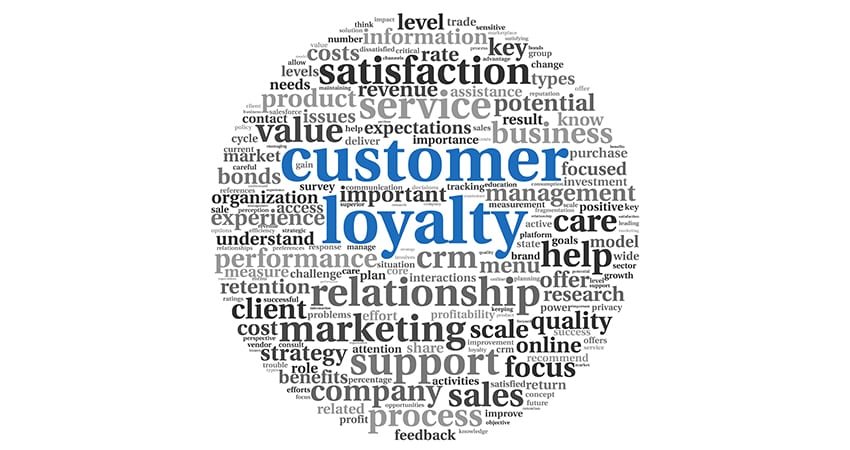When an existing customer reaches out to a company, how does their interaction start? Are they treated as an old friend with a known history, or do they need to start from square one each time they interact with the business? Perfecting customer loyalty depends upon customer experience, and this requires making all interactions with a company as easy, quick, relevant, and painless as possible from purchasing, to support and renewal.
Inherent within these aims to perfect the customer experience is the necessity to know who each customer is, and the ability for the right employee to easily and quickly access all relevant details of their relationship with the company when needed. In order to achieve this perfect customer experience you need readily-accessible mastered data.
What is the perfect customer experience?
Imagine spending over a hundred-thousand dollars on a brand-new luxury car from a local dealership only to get in a fender-bender within a few days. Upon rolling into to the dealership hoping to get a deal on some body work, no one there has any clue who the newly-minted owner is – they treat that valuable customer as a stranger. There are few things more frustrating than someone who knows that they should be viewed as a valuable customer with a history of interactions at the company in question, but having to start over the conversation with a company from scratch each time you have an issue, even if that issue is ongoing.
Customers want to feel like a company knows them, to the appropriate extent. This means that when called upon, whichever customer service team member, sales rep, or marketing person has the accurate and complete list of information that a customer would expect them to have. Namely, this is the information that a customer has freely given the company for the mutual benefit of the company and the customer. This will not only allow the conversation to continue as it naturally should, given their history, but it opens the door to develop the much sought-after deeper connection that more personalized service and outreach can establish.
Now, apply the earlier automobile scenario to a large online retailer. While the brick-and-mortar luxury car dealership should have been able to personally memorize their customer’s information at that location and provide the appropriate support, most large companies will likely never have that kind of in-person opportunity for each customer . However, with the appropriate technology and strategy, they can ensure that whoever comes in contact with the customer will know what is necessary to provide a positive experience: who they are, what they may need, and their customer history.
In short, the perfect customer experience stems from a company’s ability to know who their customers are and ensure that they have the necessary information readily available to best serve their needs.
How does customer experience drive customer loyalty?
Loyal customers are the lifeblood of most B2C businesses. According to research from Enterprise Management Associates (EMA), the longer a customer’s relationship with a company, the more they spend. EMA found that a 5% increase in customer retention can yield a 25% increase in customer profit. Moreover, the same research found that repeat customers refer more people than one-time buyers.
Many of the largest challenges to building customer loyalty stem from failures in the realm of customer experience such as unaddressed negative reviews, poor customer support, lack of timely promotions and offers, and breaches of trust such as the utilization of data that a customer did not approve of. Often, this is caused by siloed customer data that yields an incomplete picture of the customer in question. Many of these issues could have been prevented by the combination of the right data, in the right hands, at the right time.
How is data management the key?
Enter Master Data Management (MDM), which enables the assembly of a 360-degree view of each customer: who they are, where they are, what they have bought, and any problems or questions they may have had along the way. The key part of this view is the breaking-down of these data silos so all relevant information can be pulled together for a source of truth that is accurate and up-to-date.
Once this holistic view of the customer is assembled, the next step in the data management journey is to make the proper pieces of that information available to the right people when they need it. A company with a mature data management strategy will have intelligent and collaborative data management technology that can empower data champions at all levels of the enterprise that touch customer data from finance, sales and marketing, to customer support.
Reaping the benefits of perfect customer data
Once a company has perfected their customer data, and are far enough along on their data management journey, it won’t matter how a customer comes in contact with that company – whoever they come in contact with will know who they are and how they need to be helped. Properly assisting, contacting, cross-selling, upselling, and marketing to customers on the basis of an established relationship where the customer feels like they are known is key to increasing customer loyalty, and reaping the business value of a loyal customer base.
Not only will the company see the aforementioned benefits of greater retention, a more efficient support process, increased referrals, and increased cross-sells and upsells, that company will also find additional value in their mastered data. For example, increased support responsiveness and greater organizational support clarity can enable more efficient flagging of potential quality-control issues, and perfect customer data can enable more precise buying-pattern analysis to allow marketing teams to recognize patterns that will lead to more timely first-time sales.
To win customer loyalty, a business does not have to not only initially win-over their customers, they must continue to win those same customers over day in and day out. In order to do so, they have to build up the foundational technical capabilities that will enable them to know their customers and make them feel known.
Lane Hartman is Senior Marketing Manager at Semarchy

